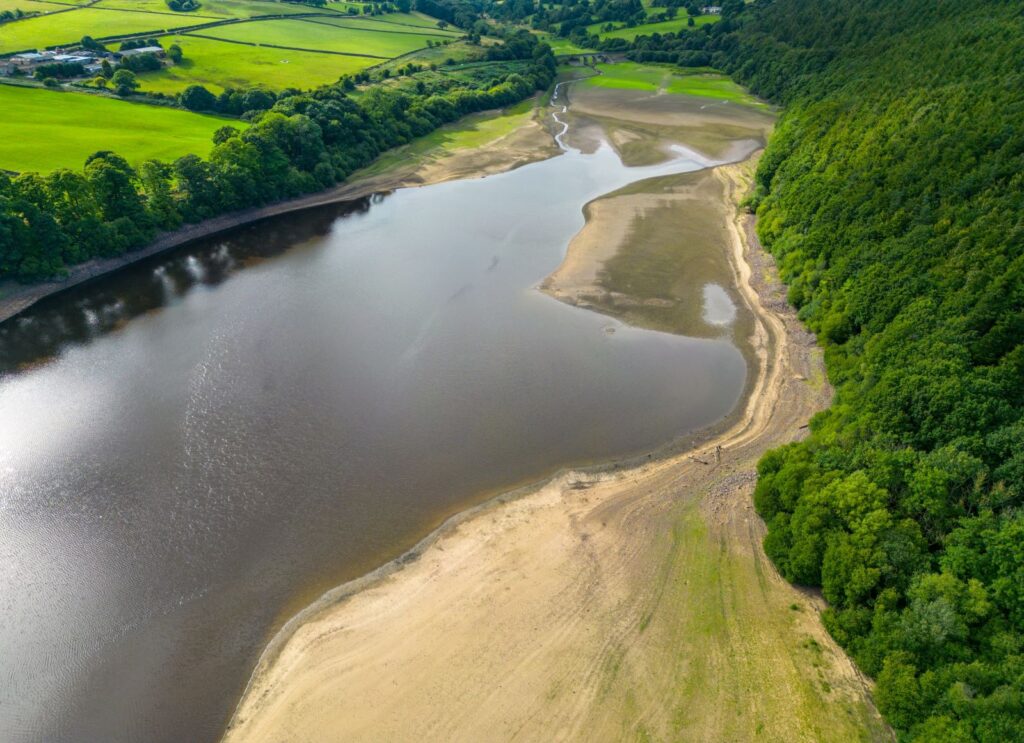Plans to increase drought resilience stepped up following record June heat
30th June 2023
As demand for water continued to build amid what has potentially been the hottest June on record, a team of national experts met earlier this week to discuss plans to maintain drought resilience and ensure plentiful water supply across the country.
Following a decline in reservoir and groundwater levels, the National Drought Group, chaired by the Environment Agency, met this Wednesday (28th June) to discuss the current situation across England and how water supplies could be better managed over the coming months.
While water levels are currently higher than they were this time last year, the effects of last summer continue to linger in the natural environment. During the meeting, the group highlighted how water companies must increase resilience to dry weather and encourage customers to reduce demand, building on the measures set out in the government’s Plan for Water.
This comes in the wake of what has potentially been the hottest June on record, according to the met office, with temperatures reaching 32.2°C on the hottest day.
To prepare for future dry weather that is set to become more consistent, the Environment Agency is urging water companies, retailers, regulators, as well as the agricultural and environment sectors to be proactive and take action now to prepare for the impacts of extreme weather.
Simon Hawkins, chair of the National Drought Group and Director Operations South East and East at the Environment Agency, said: “The recent heatwave has served as a reminder that we need to prepare for weather extremes and act now to ensure resilient water supplies.
“The Environment Agency, water companies and partners are working collaboratively to handle drought risk across the country; with our staff managing abstraction licences to balance need, ensuring water companies implement their drought plans, working with farmers to manage resources, and rescuing fish in areas where river levels are extremely low.”
Mr Hawkins stressed protecting water supplies is a shared responsibility and all must work together to ensure clean and plentiful water for future generations.
Prompt action is key for future water resilience
As climate change continues to make weather patterns more erratic, evidenced by exceptionally wet and dry weather this year, it is becoming clear that rainfall alone will not be sufficient to maintain water supplies at the required levels.
As of Tuesday 20 June, total reservoir stocks for England are at 83% of their capacity. Devon, Cornwall and parts of East Anglia are still suffering from drought despite average rainfall earlier this year.
Water minister Rebecca Pow has recently visited reservoirs in Cornwall and Devon to ascertain how the region and local residents have been affected by ongoing drought conditions.
“Through our Plan for Water, we are ensuring key water supply infrastructure such as reservoirs can be built more quickly, helping increase our resilience in the long-term,” she said.
“Whilst we all have a responsibility to protect this precious resource, water companies must step up their efforts to ensure water resilience. This includes not only increasing supplies but also reducing leakage and encouraging water efficiency to better deliver for both customers and the environment.”
The temporary use ban implemented by South West Water for the Colliford and Roadford regions (covering most of Devon and Cornwall) remains in place, while South East Water has introduced the ban in Sussex and Kent as of Monday 26th June 2023.
These measures are hoped to offset the increased demand for water due to hot weather, which is impacting how quickly treated water storage reservoirs can be refilled.
Environmental pressures are also being felt in the Lake District and North East. In the Lake District, Haweswater and Thirlmere saw a decrease of 13% in reservoir stocks between the end of April and end of May 2023, which was matched by the Teesdale reservoir group in the North East.
Water companies are continuing to closely monitor the situation and have now submitted their Water Resource Management Plans to the environment secretary and Welsh ministers where applicable. These set out how they will manage water resources to maintain supply and protect the environment through initiatives like new reservoirs and water transfer schemes.
The water companies are responsible for providing water to their customers, ensuring that public water supply is secure, and for maintaining supplies whilst minimising environmental impact. They will:
- Continue to implement their drought plans proactively
- Seek to maintain or where necessary increase water availability
- Reduce water loss by stepping up work to fix leaks
- Help their customers use less water
- Take other measures to ensure there is enough water for essential supplies.
By 2050, Defra is estimating that around four billion additional litres of water may be needed per day to meet future demand for public water supply, with experts warning that action on water resilience must be taken now to determine how these significant needs will be met.

